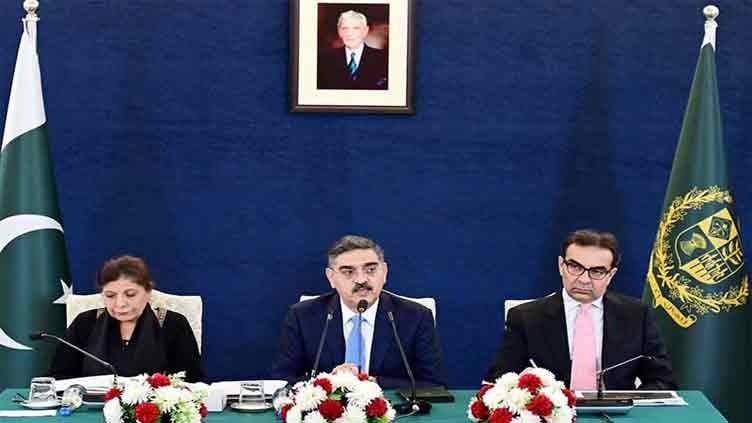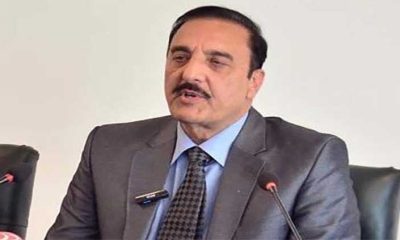Prime Minister Anwaar-ul-Haq Kakar on Sunday said a task force headed by the finance minister would determine size of federal and provincial governments, look at options to better manage pension funds, besides making efforts to rationalize public expenditure and increase revenue.
In an interview with a private TV channel, he said, “We are convinced that there is a need to rationalise expenditure and increase revenue of the government to create a viable state and lessen existential threats due to economic vulnerability.”
He said Special Investment Facilitation Council (SIFC) was attempting to help achieve appropriate governance and address the reasons for ill governance in the past. The civil institutions were lax in their working in the past but the army leadership with its organizational strength had increase the level of confidence of civil service, renewing energy to implement policies and achieve goals, he added.
The prime minister said the government was optimistic about investment from Saudi Arabia in the backdrop of talks between Crown Prince Mohammed bin Salman and Pakistan’s chief of army staff. The government was planning for a visit of the Saudi crown prince, he said, adding the visit would be aimed at fully exploiting economic opportunities in the country.
Kakar revealed that a Pakistani consortium of oil companies and Saudi oil company Aramco were in business talks for setting up an oil refinery in Pakistan. The United Arab Emirates had also shown keen interest in the exploration of minerals in Pakistan, he mentioned.
Citing skewed reasons for lack of industry and agriculture in Balochistan, he said a lenient approach was adopted in the past towards the issue of smuggling which adversely affected the economy and the goods meant for border areas went to inner parts of the country. Smuggling from border areas affected import policies and the economic management, he remarked.
Kakar said the current military leadership and caretaker government had a clear viewpoint that the movement of people and goods at the borders of Iran and Afghanistan should be regulated.
The prime minister said the personnel of law enforcement agencies – due to the clarity of thought of the political and military leadership, currently knew that borders were sacrosanct which had led to successful efforts to stem the flow of smuggled goods.
Replying to a question, he said in the post-Cold War scenario, the government was observing the geostrategic situation in the region and international arena in relation to the vital interests of Pakistan. Now Pakistan’s foreign policy was driven by geo-economics along with its core strategic goals, he noted.
To another question, he said the work of SIFC was focused on particular sectors of the economy including agriculture and it had been dealing with issues of per hectare water conservation, technology transfer, quality seed and job creation.
Kakar admitted that there was an information vacuum on the issues taken up by SIFC and said the government was coming up with a plan to keep the public informed and create awareness about taxation culture, economic initiatives and strategic issues. Relaying of information would kill rumours on its own, he remarked.
He said the caretaker government would the make right decisions instead of resorting to populism and would try to lay a foundation for the next government.
Answering a query, he said after the 18th Amendment, the incumbent president would continue in the office till his successor would replace him.
Under the prevailing law, constitution and legislation done by political parties, the Election Commission as a constitutional body would announce the date for elections, he said, adding that general elections should be held before March so that the Senate polls could be held to fill the seats made vacant by retiring Senators.
To a question about any leniency for the perpetrators of May 9 incident, he said political, social and economic stability were linked to the sense of justice and did not revolve around the concept of amnesty. Vandalism and arson could not be accepted as a norm, he continued.
Kakar said the chequered political history of the country could not be made a basis for claim for clemency as this approach was detrimental for growth of democracy. “Let us have an open debate on state institutions, nation-building and strengthening of democracy. However, we cannot reward bad behaviour with amnesty.”
While talking about his upcoming visit to the United Nations General Assembly in New York, he said it was decided that Pakistan should be represented at the highest level as it was a forum to articulate and reiterate the country’s position on issues of strategic importance.
Post Views: 70


 Sports3 months ago
Sports3 months ago
 Fashion3 months ago
Fashion3 months ago
 Sports3 months ago
Sports3 months ago
 pakistan3 months ago
pakistan3 months ago
 World3 months ago
World3 months ago
 pakistan3 months ago
pakistan3 months ago
 World3 months ago
World3 months ago
 Sports2 months ago
Sports2 months ago






















